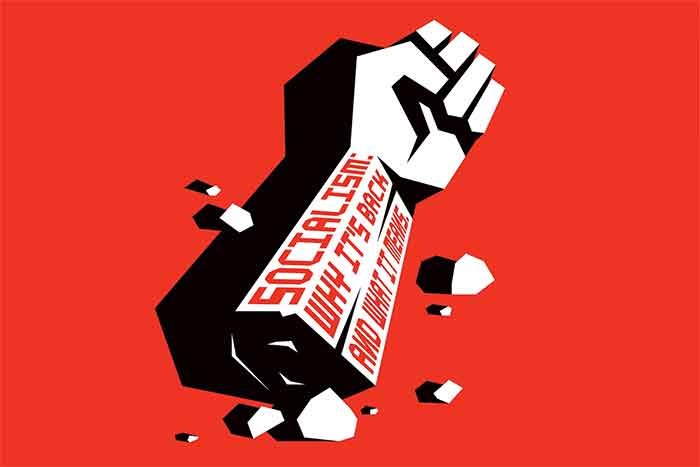American Capitalism in Crisis
Americans in large numbers are becoming puzzled and agitated. Every day newspaper headlines blare out that the US is in trouble, together with our Western free market allies. The government doesn’t work as political divisiveness freezes decision-making. The extent of inequality is “obscene,” to borrow an oft-used description by Bernie Sanders. The elected president comes over as an egomaniac and buffoon. The middle class is in continuing decline, struggling to survive through multiple jobs. The infrastructure is decaying and CEOs dismantle industry, transporting production to more profitable global domains. Racism abounds, punctuated by recurring protests against police brutality. Workers face unemployment, declining wages, reduced benefits, and weakened unions to fight their cause. Homelessness is a continuing, intractable shame. All around us students agonize about being able to afford college and old people worry about whether Social Security will hold firm for them.
At the same time, America’s foreign policy (its imperialist cast ever more obvious) has fomented a sequence of unwinnable wars that have damaged our reputation and drained our treasury—while destroying the lives of so many of our young people and of populations around the world. Increasingly Americans have disturbing doubts about what has been happening to and around them. Why else do almost a hundred million eligible voters fail to go to the polls? Scholars generally agree that capitalism is in deep crisis and many see it positioned at cliff’s edge.
The dysfunctions and heartaches of capitalism are no mystery. It stands to reason that a greed-based model emphasizing maximum profit accumulation as a philosophical value, together with dog-eat-dog competition, inevitably will cause an amassing of social ills.That’s a normal, to-be-expected result that we see around us—a lopsided distribution of wealth, a threadbare safety net, rampant racism, and a commercial, dumbed-down culture. If you expect the worst of people by legitimating and fomenting greed as a fundamental principle of economic life, with a carryover to affairs of living in general, those are the outcomes you will get. Traditionally, we count on once-a-week churches, synagogues and mosques to pick up the slack and nudge the wayfarers back to decent behavior. It’s an uneven match.
Supporters of things-as-they-are reassure us that we shouldn’t worry too much about those who fall along the way; the invisible hand of the market will lift up those who are deserving and work hard to improve their standing. This wishful thinking ultimately benefits the corporate interests that espouse it. Experience shows that the invisible hand, manipulated by its corporation puppeteers, just gives the poor and other plain folks the finger.
Inefficiencies of Capitalism
Champions of free enterprise boast that capitalism outscores all alternatives in production efficiency, assuring a high level of prosperity. These unquestioned claims of efficiency have feet of clay; they can only be sustained by conveniently disregarding important realities.
- Capitalism isn’t efficient because it spawns a constant stream of recessions and depressions—which wreck the economy and throw millions of people out of work. The National Bureau of Economic Research reports that there were 33 recessions between 1854 and 2009, lasting an average of 16 months. This calculates to 41 years of recession for that 155-year period, with some recession in over 25 percent of the years. Recessions aren’t only recent and many have been severe, as in the aptly-named panics of 1857, 1873, 1893, 1896, 1907, and 1910. Our historic economic instability, with repeating unemployment and its miseries, hardly portrays an efficient or even a well-functioning system.
Marx observed that the capitalist system requires a pool of unemployed to be on hand for work when depressed times climb to boom times. Most mainstream economists posit that unemployment is a regular, recurring feature of our system.
Looking at these distresses in capitalism, an open-minded observer might ask, “Why doesn’t the criterion of ongoing full employment of workers count as a prime indicator of whether an economic system is efficient?” If you complain to free enterprise supporters about people getting hurt by all those market swings, they will assume that you are sadly naïve or muddle headed. “After all,” they tell you, “that’s how it is with capitalism, it’s about risk. Creative destruction! But everyone knows it’s worth it.”
It’s time for Americans to take a deep breath and shout, “IS IT?” Time to say that the emperor has no clothes on. Risk is the life-blood of speculators; it drains the blood from ordinary families who want a stable and secure life path for themselves. Besides, big business is willing to applaud risk because bailouts rescue them, and corporate welfare lessens the blow. When you are too big to fail, risk is a sham.
- Capitalism isn’t efficient because its romance with profit maximization causes it to hold down wages and salaries to the greatest degree possible. That tactic brings deprivation to a cross-section of workers without work or not receiving a living wage, requiring them to find support through health and welfare services. The cost is passed on to the broader community (us) through taxation and charity.
Unemployment, a built-in feature of capitalism, allows owners to offer low wages to workers who are anxious to find jobs in a competitive job market. An unemployed work force produces a benchmark that serves as a sinkhole to drive down all wages.
- Capitalism isn’t efficient because it is blind to despoiling the environment and degrading the lives of citizens. This is an intrinsic, built-in characteristic of capitalism because corporations have a mandate and mindset to concentrate on profit and ignore “externalities.” Externalities are outside costs of production, including community fallouts like pollution and infrastructure destruction. This collateral damage is someone else’s problem, again, ours.
Would a fully functioning democratic socialist state be more efficient? It’s hard to say assuredly that it would because humankind, as yet, has not come around to creating a fully developed model of that form of that society. What we can say is that socialism as a system starts at a more advantaged place by not carrying the marred ideological and operational baggage that capitalism does. It has the advantage of using the criterion of production for use rather than the more volatile and predatory criterion of production for profit.
We also know that in the US there are examples of exceptionally efficient and well-run government programs. Our vast Social Security program runs smoothly year in and year out without scandal or complaint from its clientele. It has incredibly low administrative costs and its long record of running a surplus would be perpetuated through simply raising supportive progressive taxes. The Post Office delivers in every kind of weather and people warmly greet the carriers who come to their door. TVA has received ongoing accolades. The Los Angeles Water and Power Authority is widely recognized as an outstanding public institution. Less well known is the Bank of North Dakota, which is wholly owned and controlled by that state. It offers loans and promotes agriculture, commerce, and industry in the region. The institution arose because angry farmers and small businessmen in the late nineteenth and early twentieth centuries needed low-interest loans that banks were unwilling to provide. Populist pressure spurred the state to set up this enterprise, which has served its purpose well over an extended time.
Is Capitalism Ordained?
Many Americans feel we have to simply accept the kind of suffering free enterprise imposes because capitalism is a natural force and somehow ordained. Margaret Thatcher sloganized this with the watchword TINA—There Is No Alternative. People in the past living under feudalism and the monarchies that followed believed, in the same way, that their systems were ordained, essentially through divine will. That held until human intelligence prevailed and developed systems marked by political democracy and capitalism.
Human intelligence is now poised to move beyond political democracy and create economic democracy—where our industrial czars no longer dominate the workings of the economy for their own benefit. We are ready to establish a system where citizens are in charge of economic decisions that impact their lives through actions they mandate from their elected government. Citizens in that position would be fully empowered and encouraged to change damaging economic processes that bring them instability and anguish.
Democratic Socialist Alternative
Democratic socialist activists commit to righting the failings of capitalism and to bringing into being a new way of life based on elevated humanitarian principles. There would be greater equality and fairness for all, a more compassionate tone in human relationships, and significant participation by citizens of every social status in political and economic decision-making. This socialist vision has been espoused by such ethical thinkers in the United States as John Dewey, Albert Einstein, Helen Keller, Martin Luther King. Jr., Upton Sinclair, Eugene V. Debs, and Michael Harrington.
Economic Planning
Democratic socialism assumes that there should be some degree of public, democratically-guided, economic planning. That kind of organized steering of the economy would eliminate the constant, misery-producing downturn cycles of free enterprise. Production for use to meet social needs would move economic development toward serving the living requirements of the citizenry rather than the profit objectives of corporations. Democratic socialists, of course, insist that citizens elect (and hold the power to replace) those who make these economic policies. Government forthe people is a preoccupation of democratic socialism, but so is government by the people.
A commitment to economic democracy requires that national planning be integrated with widespread decentralized regional and grassroots planning. There is an existing prototype of democratic enterprise in the United States in the cooperative movement—food coops, credit unions in banking, insurance services and travel, among others, Effective and ethical planning would aim to bring into being a judicious balance of bottom-to-top combined with top-to-bottom economic decision-making: a delicate mixture of the horizontal melded with the vertical.
The blunt authoritarianism and total nationalization of the Stalin regime was an ugly distortion of socialism and of meaningful planning. It was then and is now vehemently rejected by democratic socialists. Some industries surely would be under public control, but which ones and how many is an open question. There’s variation among socialist thinkers as to what ought to be the optimal mix of public enterprise and private enterprise.
To start, it might be good policy to make public about 100 or so of the largest corporations and leave others privately run. Prime candidates might be transportation, health, utilities, insurance, weapons manufacturers, and industries with a climate change impact. Based on that in-the-real-situation experience, and citizen voting input, the rate, type, and extent of public ownership would be scaled up or down. It would be essential to include features of cooperatives and workplace democracy in national enterprises.
An important socialist aim is workplace democracy, with worker self-management and control of enterprises. Those employed in enterprises would help make decisions about production issues and how surplus income (“profit”) is distributed, shared, and invested. Those responsibilities would be in the hands of workers and consumer representatives on joint worker-consumer boards. Workers would have the responsibility (and given the training) to learn the skills of competent management. The impressive Mondragon Industrial Cooperative in Spain is a model that could be adapted. The US Steelworkers are engaged in establishing a replication of sorts in this country. Workplace autonomy could result in unhealthy competition among enterprises, so measures would need to be thought through and instituted (such as workplace regional councils) to minimalize harmful effects.
A Push for Full Equality
Equality is a core value in socialist thought and would be pursued determinedly. Total equality, though, is an unrealistic goal; relative equality is a reasonable aspiration—a floor and a ceiling. The voice of the citizenry would define “reasonable.” Steep progressive taxes would be put in place, calibrating tax rates with the capacity to pay. There’s no awkwardness among socialists, who are poverty abolitionists, about narrowing huge disparities in wealth through policies of redistribution. New welfare provisions would assure that all citizens have ample resources to meet needs across the life span. That notion is put forth in a useful 2011 document of the Democratic Socialists of America, A Social and Economic Bill of Rights for the 21st Century.
DSA makes the case that citizen’s rights should be extended beyond those of political democracy (like guarantees of free speech and religion) to include those of economic democracy (like guarantees of a decent education and income). DSA identifies a range of economic/social rights for everyone: a living minimal wage job; affordable and safe housing; appropriate health care; adequate food and nutrition; free, high quality public education, including college; income security throughout one’s lifetime; a healthy physical environment; ample leisure time; and a right to freely belong to unions and civic organizations of one’s choice. These principles are echoed in the 1948 UN Declaration on Human Rights and in Franklin D. Roosevelt’s Four Freedoms Speech of 1941. With overpopulation on the horizon and increased use of automation, some also advocate 40 hours pay for 30 hours work to spread out good-paying job opportunities.
The DSA document gives details for each of the rights. DSA estimates that the cost for the needed services is within our grasp even now in the US and could be met through pertinent legislation: forthright progressive taxation, better control of health care costs, and cutting back on our mammoth military budget (which amounts to half of the military budgets of all the other nations in the world—combined).
There’s a commitment here to fair and non-discriminatory benefits for all, without exception. Special attention would be directed toward those who customarily have been disadvantaged and discarded: the homeless, poor, disabled, workers, women, the LGBT community, among other minorities.
Conservatives and traditionalists will surely have a beef here. All of this is an assault on freedom! These programs require big government, which is by itself a liberty-robbing contrivance. They lay on taxes and procedures and rules that impose constraints and make demands on people.
There is likely a different take on this, however, by the many who are pinned down with worries and pressures about making it through life under existing conditions: worries about not having a job or one that pays enough, about educating kids, receiving the kind of medical attention they and their family need, having a roof over their heads, having a safe and comfortable old age, and about having leisure time opportunities and the cash to pay for that.
This describes where a broad swath of folks across the lower and middle classes find themselves. Many of them would surely feel that lifting these crushing everyday burdens from their shoulders by a caring government is a newly found, and delicious, freedom. It would open up possibilities to make many more choices about how they want to live and use their lives. A system that steers extravagant wealth to the very top tier thereby withholds money from people on lower rungs—robbing them of a financial base that would allow options and amenities. What is freedom for the 1% at the top may be a prison sentence for much of the other 99%.
Would Socialism Kill Innovation?
Innovation is tied in with production, but it’s a different dimension. The crucial point about innovation is that it is closely intertwined with openness and democracy. A rigid dictatorship (as in the communist Soviet Union or North Korea on the left or capitalist Saudi Arabia or Pinochet’s Chile on the right) is the enemy of innovation. It can be argued that the US record on innovation is based at least as much on its enormous natural resources as on its capitalist economy.
Free market advocates hold that innovation and productivity are inextricably married to the incentive of high monetary rewards. They ask, would Steve Jobs have designed his spectacular array of digital inventions if not for the large monetary gains he could accumulate? A disarming question. But reason suggests that given his constitutional endowment of remarkable intelligence, inquisitiveness, and drive, it’s hard to imagine him being a couch potato in whatever society he lived.
Jobs had a drive to be recognized for astonishing achievement, and if money is the chief way you get there in this society, well, that served as his modus vivendi. Steve Wozniak, his right hand in creating the remarkable Apple innovation engine said, “I never wanted money. . . . I wanted to make friends with everybody. . . to be known as a great engineer.” Much of the fortune he accumulated, he put into philanthropy.
People stretch to achieve for many reasons: patriotism; love of family and community; to gain verbal praise from others; maximize the power of their talents, receive a public award like a Pulitzer or a Tony, or just for the fun or self-satisfaction of it. The astronauts had one of the riskiest, cutting-edge jobs ever and had to develop extraordinary skills¾and none of them made a fortune doing it.
There is no way to know how material the rewards need to be. For some, a comparatively modest or even token rise in income or status would hit the mark—especially when that’s the societal norm. A firm safety net in place to lower the risk and offer protection when someone takes a big chance and fails, encourages more people to try off-the-beaten-path ventures. We should be mindful also that for the astronauts and others, it was the venture capital of the government that enabled their innovation opportunities. All of Jobs’ genius around computers might have sputtered without the flow of huge public funds, including from the Pentagon, that spawned the Internet and the entire computer technology infrastructure.
Also, consider that there are rigidities constraining innovation in the free enterprise system, such as a fixation on the bottom line in the next quarterly report. Even in the US open and democratic context, that preoccupation demolished innovation in key American industries like steel and automobile production. A social democratic country such as Sweden, with its democratic structure and socialist elements, has produced a high level of innovation (who isn’t delighted that they invented Skype and Spotify?). It’s safe to conjecture that democratic socialism is likely to reach at least the same level of innovation as capitalism. And it’s counterproductive to let fear block any steps to experiment in that direction.
For socialists, beyond innovation and production efficiency quality of life matters and that rivals standard of living—which focuses on income and material wealth. The truly good society has to arrive at a balance of these goals. A high quality of life calls for civil and humane relationships between people—what’s been called “the Beloved Community.” Early socialist efforts centered their actions on establishing utopian communities whose outcomes were iffy but whose intentions demonstrated high aims. Socialism aspires to create a new, harmonious culture alongside a better way of running things.
The accent is on the dignity and worth of every person, on people connecting and bonding free of competitive pressure, on growing trust among equals. In a socialist frame, human values clearly would stand disentangled from market calibrations of productivity and innovation. Innovation has to be linked to questions related to “for what” and “for whom?” Shouldn’t we judge society on how well it invents and produces meaningful living rather than spiffy cars and cool widgets?
A Long View and a Time to Start
Given that the socialist ethic calls for a strong commitment to others and to community, what are the chances of that coming about? Human nature being what it is (in Western capitalist society), competition and acquisitiveness cannot be washed away¾it would be folly to attempt that. Some people will still push to get ahead to gain advantage and admiration, especially in the economic sphere. But it is within our capability to tilt the equilibrium more toward compassion, both in the economy and other areas of human endeavor. Socialism makes that a public expectation, with the understanding that norms influence the actions of people.
In our own history, the Iroquois Confederacy and other Native American peoples shared common property and crops, had a gift economy, and dwelt and stored supplies together in longhouse living arrangements. For them, cooperation rather than competition defined human nature. Our educational system and public media need to be redirected toward conveying these humanistic values instead of the commercial and acquisitive values that are so pervasive and inescapable under capitalist control.
Today there is considerable skepticism afoot about whether humans are capable of creating and living in a society with high moral standards. That needs testing in the doing. Altruism has been a trait of the human race always, starting at least with the Good Samaritan (earlier in Native societies). That core can be built upon and expanded. To not try assures failure. To venture forward offers remarkable possibilities for the future, including a better life for our children and grandchildren.
It stands to reason that large-scale social and economic changes take time and watchful experimentation to bring to fulfillment. Democratic socialism won’t emerge full-blown with the snap of anyone’s fingers. The capitalist class will do everything in its mighty power to block even a miniscule toehold, as it did in Chile, Vietnam, the Congo and worldwide. A scrutinizing eye sees that the free market crowd consistently puts solid blocks in the way of the free expression of ideas and developments that threaten its hegemony (try to get a socialist op-ed into your local newspaper).
A new framework for human affairs will be established only over time through intensive education, protest, political drive, and a struggle to sustain the people’s ultimate vote in the face of fierce elite obstruction. When a new socialist structure is put in place, there would be early beta versions with bugs in need of fixing. A testing and piloting process is essential. America’s project in establishing political democracy has required continual adjustments for over two centuries through Supreme Court rulings and citizen initiatives. The revered American Constitution has required twenty-seven fix-up Amendments, with another six proposed by Congress but not ratified by a sufficient number of states. There certainly would be a need for similar alertness and patience in refining a new design for society.
The time, though, to make a start is the present. The current unsettled and disturbing political landscape signals that it’s crucial for us to think out of the box, to consider organizing ourselves in ways that produce fewer poor and disadvantaged families and a decent standard of life for all, while also shaping a cooperative style and humane relationships among people.
Democratic socialism, among all alternatives, stands as likely to bring that conception out into public discourse and political contention. Tom Paine, a genuine prophet of the American Revolution, characterized that tumultuous time of conflict and transformation in these words: “We have it in our power to begin the world over again.” Our generation and the democratic socialist movement now have the same challenge and opportunity to join together to shape a better way of life for humanity.
Dr Jack Rothman, professor emeritus in the UCLA Luskin School of Public Affairs















































